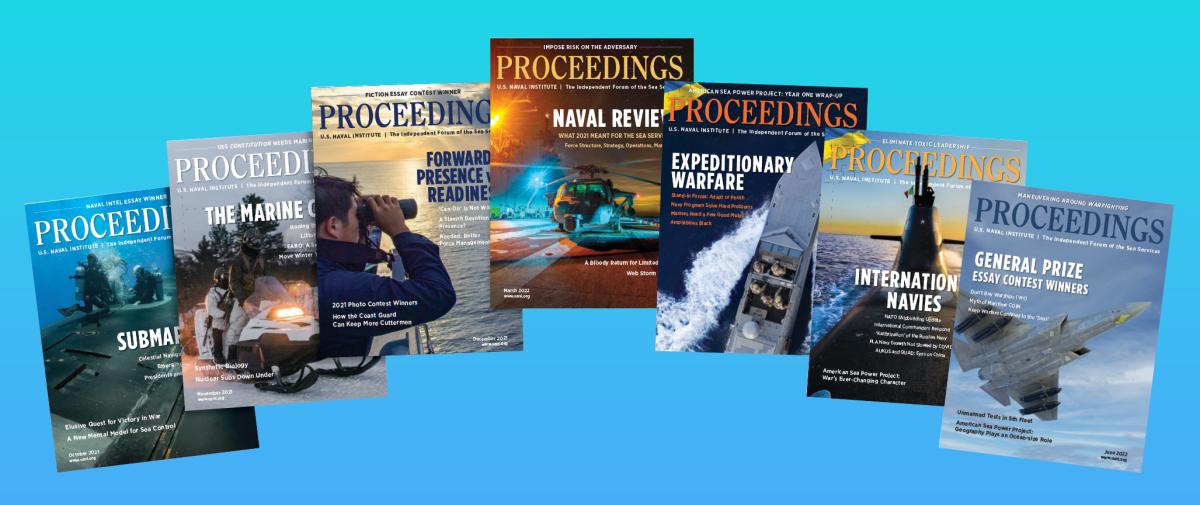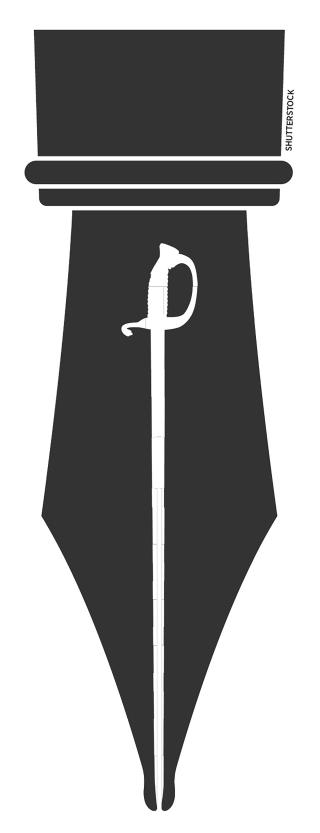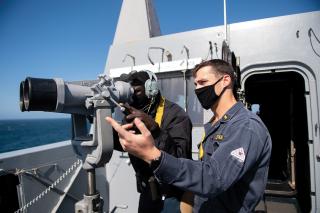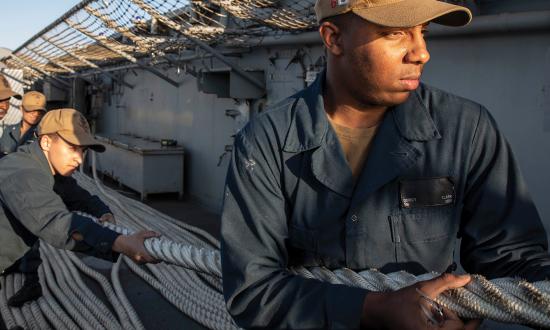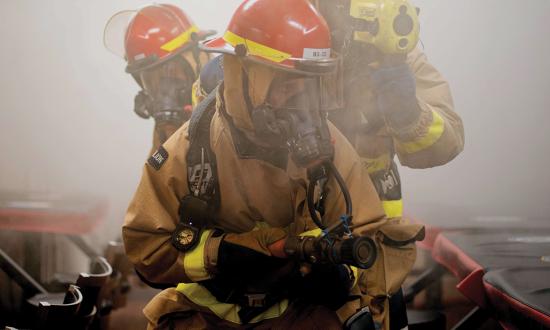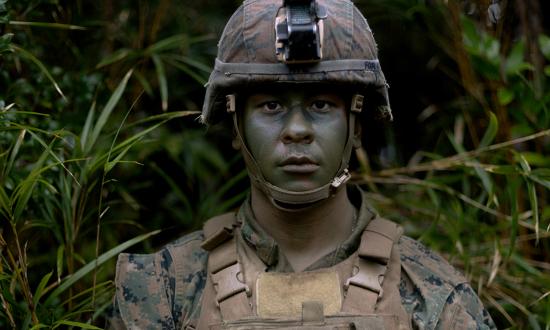Communication matters. Whether the context is preparing sailors and Marines for battle, persuading people to complete mandatory training on time (for once), or simply avoiding misunderstandings, how a leader communicates should be like other forms of risk exposure—intentional, never accidental. Great leaders can inspire their personnel through impassioned speeches or compelling prose. Poor leaders can cripple morale through careless communication. The critical difference is that becoming effective communicators does not happen on a whim. Communication requires time and effort to develop, much as any other skill matures from novice aptitude into professional expertise.
For junior officers, there is no more opportune time to develop communication abilities than as department heads or division officers. The core advantage of serving between eagle and butter bar is that senior-junior officers begin to see more of the big picture while still touching the deckplates. Department heads in particular are more than just middle management.1 These tours are a prime opportunity to develop the communication style that can define one as a senior leader.2 Future success can hinge on how junior officers use this time.
How best to develop inspirational future leaders and their requisite communication skills?3 Despite the disproportionate role speeches play when people think about motivation, writing matters just as much. Without effective written communication skills, a leader inevitably will fall short of influencing subordinates, as well as fail to convey his or her intent to higher command.
Why Writing Matters
Most people have heard the saying, “The pen is mightier than the sword.” Many people use this proverb to argue that words can be more powerful than weapons, but there are different implications for service members. After all, words are not a sailor or Marine’s weapons—weapons are their weapons.4 If one person brings a pen to a gunfight, and someone else brings a rifle, good luck to the pen-wielder. Instead, the point is to bring the right tool to the right fight. A rifle is for facing enemies, and a pen for facing allies. Words are how to persuade senior leaders, peers, or subordinates to see a point of view. Good persuasion and good leadership depend on good communication.
Writing is an important tool in building effective communication as a leader. One major benefit is that writing habits can demonstrate one’s communication style. Grammar can reinforce content and impose gravitas in line with author intentions, but its principles can be wielded with either a clumsy grasp or deft precision. For example, if a writer overuses commas, by putting too many, into a sentence, people may believe that the author speaks, like William Shatner. That only works in small doses, and only really works for Shatner. Some punctuation marks—such the em-dashes surrounding this phrase—can draw attention to how authors interrupt a thought with another thought for the sake of emphasis. These grammatical mechanics convey either disorganization of ideas or intentional emphasis depending on how they are employed.
Understanding writing principles underscores how different techniques might communicate different thoughts to an audience, and effective leaders cannot let poor communication interfere with the commander’s intent.
Creating a Culture of Good Communication
Good leaders are not produced by accident. Neither is good communication. Sharpening written communication skills requires effort and dedication. Still, there is a feedback loop that describes the necessary steps to create a culture of good communication: 1) a forcing function; 2) constructive criticism; and 3) the willingness to incorporate feedback.
Many leadership initiatives serve as forcing functions throughout the Navy and Marine Corps. Examples include the Intermediate Leadership Course and Joint Professional Military Education, which might require a thesis project or other writing during the coursework. Another possibility might be essay contests run by the Naval Institute.5 The core point is that a forcing function can shape the communication abilities of future leaders by turning possibility into action.
Although a forcing function creates opportunity, the prospects are lost without another critical component—feedback. Writing assignments from professional courses are more about content than communication style. Formal essay contests may create an opportunity, but the only people who get feedback are the ones whose articles are published. In other words, the only people getting feedback are ones who need it least.
Peer review is a critical element of developing effective communication, and any forcing function without peer review lacks a critical element to optimize the opportunity. Imagine trying to improve marksmanship by firing a rifle over and over without any idea whether you hit the target. Just as a marksman must hit a certain point on a physical target, the communicator must channel a message into a specific point for the audience. Writing without feedback is only slightly less wasteful than marksmanship without a target because, while it costs time, at least it doesn’t waste ammunition. If the exercise is not going to garner feedback, then seek out another avenue for peer review.
When feedback is provided, there is a final component necessary to complete the loop: The sailor or Marine must be willing to accommodate that feedback and make changes. A necessary part of leadership is identifying strengths and weaknesses so that subsequent actions may enhance the former and shore up the latter. Doing so requires understanding that growth is equal parts effort and humility. Furthermore, constructive criticism is always better received than sarcasm, cynicism, or outright schadenfreude. Critics derail and demean leadership development when they provide spiteful comments. Not all feedback needs to be positive, but for all feedback to be useful, it should be constructive in the recommendations made to improve the individual as a future leader.
Repeat the process as necessary to achieve desired results.
Turning Thought into Action
So, if the pen is mightier than the sword, how does it compare to a trident?
For confirmation that good communication is a component of good leadership, look no further than the Naval Special Warfare (NSW) Leader Assessment Program (NLAP). This innovative program demonstrates how special operations embraces a truly comprehensive view when evaluating leadership potential. Among the many tools used to gauge future leaders of the SEAL and Special Warfare Combatant Craft Crewman community, there is an executive writing assessment designed to probe communication capabilities.
The intent is threefold. First, to determine a candidate’s ability to read, understand, and follow a stated task. Second, to test a candidate’s ability to draft a strong message. Third, to have the candidate address specific special warfare issues relevant to their next leadership milestone position. Combined, this exercise uses the core ideas presented here as a vehicle to enhance leadership.
Now for the specific process. The first step involves setting a standard. The NLAP grading rubric is flexible and allows both graders and candidates to understand what constitutes “unsatisfactory” or “exemplary” across several dimensions, including both content and technical writing. In doing so, NSW explicitly identifies communication principles important for future leaders without mandating the specifics.
To create a culture of good communication, the next step is establishing common expectations. So, everyone uses the same rubric. Everyone—both graders and participants—sees this rubric in advance to ensure that all personnel involved know and understand the standard. Common expectations and common language become crucial to creating a culture rather than grading an exercise. The challenge is identifying a writing exercise best tailored to the level of seniority and experience of the candidate. In response, multiple exercises exist based on different screening milestones. Apply the right assessment at the right milestone so the process focuses on the sailor’s growth rather than screening for this job.
The final NLAP component embraces a critical element of the feedback loop—that is, feedback itself. Candidates receive scores to quantify their efforts, but they receive more than just a number. Content and technical graders provide detailed feedback about both weaknesses and strengths. Weaknesses are obviously useful in that all candidates need to know where they could do better. However, feedback concerning strength matters just as much. How they double down on the good, or lean into the unique, is how writers discover their voices.
Developing a writing style is a path littered with trial-and-error not unlike the many identities we wear before settling into the men and women we eventually become. In short, junior officers develop into future leaders as much by learning what they are doing right as avoiding future instances of what they have done wrong. NLAP gives each candidate the chance to experience this writing whetstone, and, with their constructive feedback in hand, evolve into future leaders.
The Take-Home Message
Good leadership requires good communication. That is true whether you serve on the bridge of an aircraft carrier, in the Pentagon, or at a Naval Special Warfare command. Subordinates need to understand their leader’s orders, and the burden of clear communication is on the communicator, not the listener. Therefore, the burden of communication is on the leader.
Although there are many ways to become a better leader, writing is undeniably an important function—especially for junior officers. Junior officers start seeing more of the big picture while still seeing enough of the deckplate. They draft ghost emails and prepare materials for senior leaders while also overhearing scuttlebutt about how those materials were received. It is a unique time to enhance communication skills, and writing is a forcing function for that development. Someone could focus more on an oral presentation rather than the penned alternative, but writing has the advantage of being deliberate. Someone might belt out impassioned words in the heat of a crisis, yet no one has ever accidentally typed a leadership essay.
Work hard to develop writing proficiency whether responding to senior leaders or communicating with subordinates and see how those thoughts are received. Seek out constructive criticism rather than hollow praise—make deliberate efforts.
Write like a leader.
1. LCDR Fred F. Kacher, USN, “So, You Want to Be a Department Head? U.S. Naval Institute Proceedings 128, no. 8 (August 2002).
2. CDR Adam Stein, USN, “Department Heads Can Do Better,” U.S. Naval Institute Proceedings 147, no. 6 (June 2021).
3. Arguably the most comprehensive existing material is this book: ADM James Stravridis and RADM Robert Girrrier, USN (Ret.), with CDRs Jeffrey Heems and Thomas Ogden, USN, Division Officer’s Guide, 12th ed. (Annapolis, MD: Naval Institute Press, 2017).
4. Credit to the television show Community, season 5, episode 8, “App Development and Condiments,” for this exchange:
Britta: I’m a psych major. Words are my weapons!
Security Guard: I’m a security guard. Weapons are my weapons.
5. For a meta citation, see the following link about the Naval Institute Leadership Essay Contest in an essay submitted to the Naval Institute Leadership Essay Contest: www.usni.org/essay-contests/leadership-essay-contest. The link is to the archival site rather than the 2021 site in the hopes that someone finds this citation years from now.



